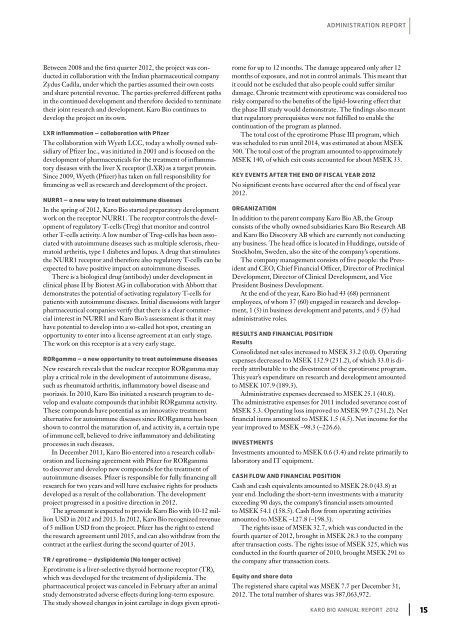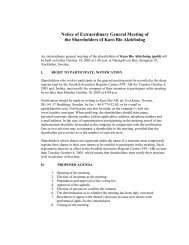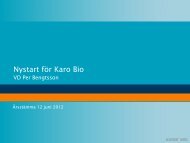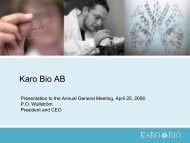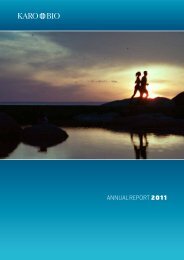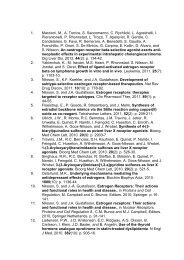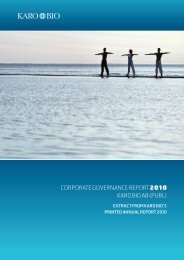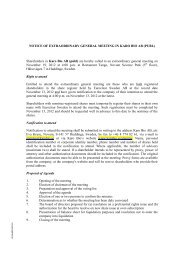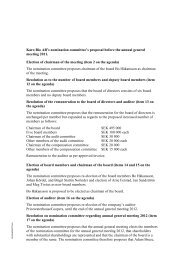Annual Report 2012.pdf - Karo Bio
Annual Report 2012.pdf - Karo Bio
Annual Report 2012.pdf - Karo Bio
You also want an ePaper? Increase the reach of your titles
YUMPU automatically turns print PDFs into web optimized ePapers that Google loves.
Administration <strong>Report</strong><br />
Between 2008 and the first quarter 2012, the project was conducted<br />
in collaboration with the Indian pharmaceutical company<br />
Zydus Cadila, under which the parties assumed their own costs<br />
and share potential revenue. The parties preferred different paths<br />
in the continued development and therefore decided to terminate<br />
their joint research and development. <strong>Karo</strong> <strong>Bio</strong> continues to<br />
develop the project on its own.<br />
LXR inflammation – collaboration with Pfizer<br />
The collaboration with Wyeth LCC, today a wholly owned subsidiary<br />
of Pfizer Inc., was initiated in 2001 and is focused on the<br />
development of pharmaceuticals for the treatment of inflammatory<br />
diseases with the liver X receptor (LXR) as a target protein.<br />
Since 2009, Wyeth (Pfizer) has taken on full responsibility for<br />
financing as well as research and development of the project.<br />
NURR1 – a new way to treat autoimmune diseases<br />
In the spring of 2012, <strong>Karo</strong> <strong>Bio</strong> started preparatory development<br />
work on the receptor NURR1. The receptor controls the development<br />
of regulatory T-cells (Treg) that monitor and control<br />
other T-cells activity. A low number of Treg-cells has been associated<br />
with autoimmune diseases such as multiple sclerosis, rheumatoid<br />
arthritis, type 1 diabetes and lupus. A drug that stimulates<br />
the NURR1 receptor and therefore also regulatory T-cells can be<br />
expected to have positive impact on autoimmune diseases.<br />
There is a biological drug (antibody) under development in<br />
clinical phase II by <strong>Bio</strong>test AG in collaboration with Abbott that<br />
demonstrates the potential of activating regulatory T-cells for<br />
patients with autoimmune diseases. Initial discussions with larger<br />
pharmaceutical companies verify that there is a clear commercial<br />
interest in NURR1 and <strong>Karo</strong> <strong>Bio</strong>’s assessment is that it may<br />
have potential to develop into a so-called hot spot, creating an<br />
opportunity to enter into a license agreement at an early stage.<br />
The work on this receptor is at a very early stage.<br />
RORgamma – a new opportunity to treat autoimmune diseases<br />
New research reveals that the nuclear receptor RORgamma may<br />
play a critical role in the development of autoimmune disease,<br />
such as rheumatoid arthritis, inflammatory bowel disease and<br />
psoriasis. In 2010, <strong>Karo</strong> <strong>Bio</strong> initiated a research program to develop<br />
and evaluate compounds that inhibit RORgamma activity.<br />
These compounds have potential as an innovative treatment<br />
alternative for autoimmune diseases since RORgamma has been<br />
shown to control the maturation of, and activity in, a certain type<br />
of immune cell, believed to drive inflammatory and debilitating<br />
processes in such diseases.<br />
In December 2011, <strong>Karo</strong> <strong>Bio</strong> entered into a research collaboration<br />
and licensing agreement with Pfizer for RORgamma<br />
to discover and develop new compounds for the treatment of<br />
autoimmune diseases. Pfizer is responsible for fully financing all<br />
research for two years and will have exclusive rights for products<br />
developed as a result of the collaboration. The development<br />
project progressed in a positive direction in 2012.<br />
The agreement is expected to provide <strong>Karo</strong> <strong>Bio</strong> with 10-12 million<br />
USD in 2012 and 2013. In 2012, <strong>Karo</strong> <strong>Bio</strong> recognized revenue<br />
of 5 million USD from the project. Pfizer has the right to extend<br />
the research agreement until 2015, and can also withdraw from the<br />
contract at the earliest during the second quarter of 2013.<br />
TR / eprotirome – dyslipidemia (No longer active)<br />
Eprotirome is a liver-selective thyroid hormone receptor (TR),<br />
which was developed for the treatment of dyslipidemia. The<br />
pharmaceutical project was canceled in February after an animal<br />
study demonstrated adverse effects during long-term exposure.<br />
The study showed changes in joint cartilage in dogs given eprotirome<br />
for up to 12 months. The damage appeared only after 12<br />
months of exposure, and not in control animals. This meant that<br />
it could not be excluded that also people could suffer similar<br />
damage. Chronic treatment with eprotirome was considered too<br />
risky compared to the benefits of the lipid-lowering effect that<br />
the phase III study would demonstrate. The findings also meant<br />
that regulatory prerequisites were not fulfilled to enable the<br />
continuation of the program as planned.<br />
The total cost of the eprotirome Phase III program, which<br />
was scheduled to run until 2014, was estimated at about MSEK<br />
300. The total cost of the program amounted to approximately<br />
MSEK 140, of which exit costs accounted for about MSEK 33.<br />
KEY EVENTS AFTER THE END OF FISCAL YEAR 2012<br />
No significant events have occurred after the end of fiscal year<br />
2012.<br />
ORGANIZATION<br />
In addition to the parent company <strong>Karo</strong> <strong>Bio</strong> AB, the Group<br />
consists of the wholly owned subsidiaries <strong>Karo</strong> <strong>Bio</strong> Research AB<br />
and <strong>Karo</strong> <strong>Bio</strong> Discovery AB which are currently not conducting<br />
any business. The head office is located in Huddinge, outside of<br />
Stockholm, Sweden, also the site of the company’s operations.<br />
The company management consists of five people: the President<br />
and CEO, Chief Financial Officer, Director of Preclinical<br />
Development, Director of Clinical Development, and Vice<br />
President Business Development.<br />
At the end of the year, <strong>Karo</strong> <strong>Bio</strong> had 43 (68) permanent<br />
employees, of whom 37 (60) engaged in research and development,<br />
1 (3) in business development and patents, and 5 (5) had<br />
administrative roles.<br />
RESULTS AND FINANCIAL POSITION<br />
Results<br />
Consolidated net sales increased to MSEK 33.2 (0.0). Operating<br />
expenses decreased to MSEK 132.9 (231.2), of which 33.0 is directly<br />
attributable to the divestment of the eprotirome program.<br />
This year’s expenditure on research and development amounted<br />
to MSEK 107.9 (189.3).<br />
Administrative expenses decreased to MSEK 25.1 (40.8).<br />
The administrative expenses for 2011 included severance cost of<br />
MSEK 5.3. Operating loss improved to MSEK 99.7 (231.2). Net<br />
financial items amounted to MSEK 1.5 (4.5). Net income for the<br />
year improved to MSEK –98.3 (–226.6).<br />
Investments<br />
Investments amounted to MSEK 0.6 (3.4) and relate primarily to<br />
laboratory and IT equipment.<br />
Cash flow and financial position<br />
Cash and cash equivalents amounted to MSEK 28.0 (43.8) at<br />
year end. Including the short-term investments with a maturity<br />
exceeding 90 days, the company’s financial assets amounted<br />
to MSEK 54.1 (158.5). Cash flow from operating activities<br />
amounted to MSEK –127.8 (–198.3).<br />
The rights issue of MSEK 32.7, which was conducted in the<br />
fourth quarter of 2012, brought in MSEK 28.3 to the company<br />
after transaction costs. The rights issue of MSEK 325, which was<br />
conducted in the fourth quarter of 2010, brought MSEK 291 to<br />
the company after transaction costs.<br />
Equity and share data<br />
The registered share capital was MSEK 7.7 per December 31,<br />
2012. The total number of shares was 387,063,972.<br />
KARO BIO <strong>Annual</strong> <strong>Report</strong> 2012 15


